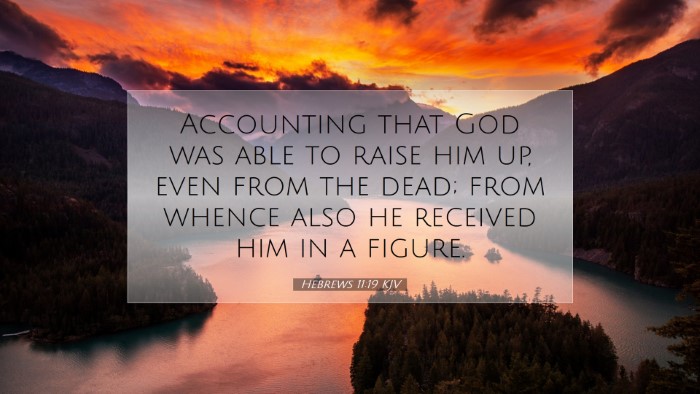Commentary on Hebrews 11:19
Verse Context: Hebrews 11:19 states, "Accounting that God was able to raise him up, even from the dead; from whence also he received him in a figure." This text fits into the larger narrative of faith illustrated throughout Hebrews 11, which highlights the faith of Old Testament figures and their reliance on God's promises.
Exegesis of Hebrews 11:19
This verse specifically reflects Abraham's faith, particularly his actions surrounding the near-sacrifice of his son Isaac as recorded in Genesis 22. The use of the term "accounting" indicates a rational assessment by Abraham, where he evaluated God's promise against the backdrop of the seemingly contradictory command to sacrifice Isaac.
Faith Illustrated
Matthew Henry’s Commentary: Matthew Henry emphasizes that Abraham's unwavering faith was rooted in his understanding of God's power. He believed that God could raise Isaac from the dead, illustrating not only Abraham's trust in God’s promises but also a foreshadowing of the resurrection that is central to Christian theology.
Albert Barnes’ Notes: Barnes elaborates that Abraham’s reasoning reflects a profound confidence in God’s ability. He posits that Abraham viewed Isaac's potential death not as an end but as a transient phase in God's greater plan, which reflects the nature of faith that anticipates God’s power even in bleak situations.
Adam Clarke’s Commentary: Clarke draws attention to the term "received him in a figure," suggesting that Isaac's resurrection in Abraham's faith was symbolic of the ultimate resurrection of Christ. Clarke argues that Abraham’s faith serves as a precursor to the full revelation of God’s redemptive plan through Jesus Christ.
Theological Implications
The Nature of Faith: The faith exhibited by Abraham serves as a prototype for believers. It challenges modern readers to consider their own understanding of God's promises and the extent of their faith in His ability to fulfill them. Henry notes that faith is not merely belief but also involves an active response to God's commands, even when circumstances appear contradictory.
Resurrection Hope: This passage highlights the theme of resurrection, which resonates through the New Testament. Barnes emphasizes the implications of God’s power to raise the dead, establishing a foundational belief for Christians regarding eternal life and offering confidence in God’s ultimate plan for humanity. Clarke connects this resurrection theme with the hope believers have, based on Christ's victory over death.
Typology of Isaac: Clarke and Henry both touch on the typological relationship between Isaac and Christ. Isaac’s near-sacrifice foreshadows Christ's atoning death and subsequent resurrection. This typology is significant for theological education, as it reveals the continuity of God’s redemptive story throughout Scripture.
Application for Today
- Encouragement in Trials: Just as Abraham faced an overwhelming test of faith, contemporary believers are often called to trust God in challenging circumstances. This verse inspires confidence that God remains sovereign and can bring life from death—spiritually and physically.
- Call to Rational Faith: The intellectual aspect of faith displayed by Abraham invites believers to engage their minds. True faith is not blind; it involves understanding and rational assessment of God’s character and promises.
- Living in Hope: The assurance of resurrection encourages believers to live with a forward-looking hope. This perspective shifts focus from present difficulties to the eternal glory that awaits, aligning well with pastoral teachings during times of grief or uncertainty.
Conclusion
Hebrews 11:19 encapsulates profound truths about faith, resurrection, and God’s sovereignty. Drawing from the insights of Matthew Henry, Albert Barnes, and Adam Clarke, we find a rich understanding of how Abraham's experience is relevant to both ancient and modern audiences. For pastors, students, and theologians, this verse serves not only as a historical account but as a foundation for understanding the essence of faith and hope in God’s promises. The narrative encourages a deeper exploration of how God’s power can sustain believers through trials and how faith, especially in difficult times, can lead to transformative outcomes.


